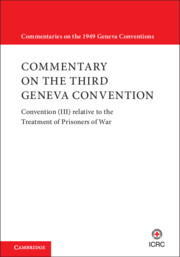 Commentary on the Third Geneva Convention
Commentary on the Third Geneva Convention Book contents
- Commentary on the Third Geneva Convention
- International Committee of the Red Cross
- Copyright page
- Contents
- Foreword by Peter Maurer
- Acknowledgements
- Abbreviations
- Introduction
- Preamble
- Part I General Provisions
- Part II General Protection of Prisoners of War
- Article 12 Responsibility for the Treatment of Prisoners and Conditions for their Transfer to Another Power
- Article 13 Humane Treatment of Prisoners
- Article 14 Respect for the Persons and Honour of Prisoners
- Article 15 Maintenance of Prisoners
- Article 16 Equality of Treatment of Prisoners
- Part III Captivity
- Part IV Termination of Captivity
- Part V Information Bureaux and Relief Societies for Prisoners of War
- Part VI Execution of the Convention
- Book part
- Sources
- Index
- References
Article 16 - Equality of Treatment of Prisoners
from Part II - General Protection of Prisoners of War
Published online by Cambridge University Press: 21 August 2021
- Commentary on the Third Geneva Convention
- International Committee of the Red Cross
- Copyright page
- Contents
- Foreword by Peter Maurer
- Acknowledgements
- Abbreviations
- Introduction
- Preamble
- Part I General Provisions
- Part II General Protection of Prisoners of War
- Article 12 Responsibility for the Treatment of Prisoners and Conditions for their Transfer to Another Power
- Article 13 Humane Treatment of Prisoners
- Article 14 Respect for the Persons and Honour of Prisoners
- Article 15 Maintenance of Prisoners
- Article 16 Equality of Treatment of Prisoners
- Part III Captivity
- Part IV Termination of Captivity
- Part V Information Bureaux and Relief Societies for Prisoners of War
- Part VI Execution of the Convention
- Book part
- Sources
- Index
- References
Summary
Article 16 is one of the five introductory articles in Part II of the ThirdConvention that set down the fundamental principles for the protection ofprisoners of war. It is based on the overarching principles of humanity andhumane treatment, encompassing a broad prohibition of discrimination amongprisoners of war and making equal treatment an essential component of theirprotection.
- Type
- Chapter
- Information
- Commentary on the Third Geneva ConventionConvention (III) relative to the Treatment of Prisoners of War, pp. 636Publisher: Cambridge University PressPrint publication year: 2021
